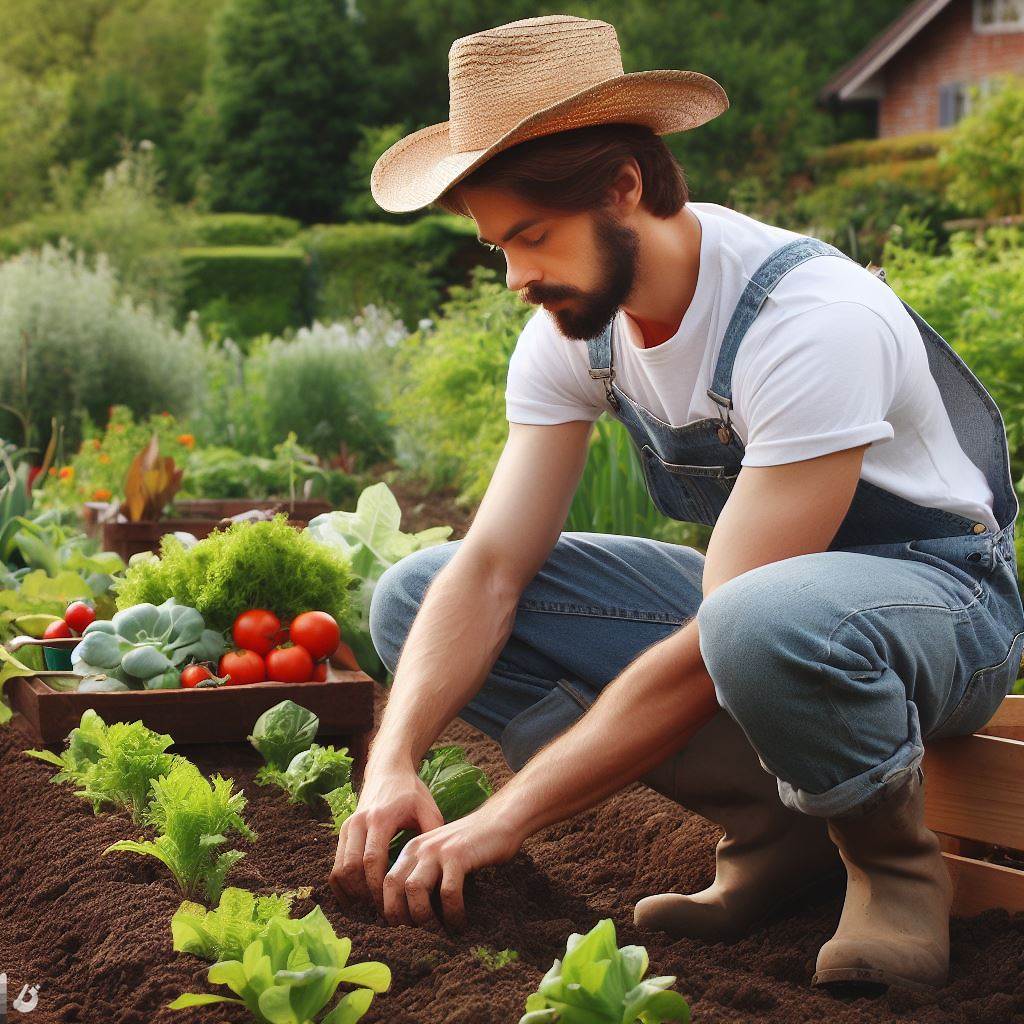Introduction
Organic farming is a sustainable agricultural practice that relies on natural methods to grow crops.
It avoids the use of synthetic fertilizers, pesticides, and genetically modified organisms (GMOs).
Instead, organic farmers focus on building healthy soil, promoting biodiversity, and maintaining ecological balance.
The importance of organic farming lies in its ability to protect the environment.
By avoiding the use of harmful chemicals, organic farmers reduce water pollution, soil erosion, and the loss of biodiversity.
They also prioritize the health and well-being of consumers by producing nutritious, pesticide-free food.
Organic farming contributes to the long-term sustainability of our planet by promoting healthy ecosystems.
In the context of organic farming, small plots refer to relatively small areas of land used for cultivation.
They can be backyard gardens, community gardens, or small-scale farms.
Small plots are ideal for individuals or groups who want to grow their own food, engage in sustainable farming practices, and promote local food production.
For small plot farmers, organic farming offers numerous benefits. It requires less space and resources compared to conventional farming methods.
By maximizing the use of available land, small plot farmers can produce high-quality organic food for personal consumption or local markets.
Organic farming on small plots also encourages community engagement, knowledge sharing, and the development of a sustainable food system.
Organic farming on small plots is an essential practice that fosters environmental protection, promotes healthy food production, and encourages community involvement.
It allows individuals and communities to take control of their food systems and contribute to a more sustainable future.
Transform Your Agribusiness
Unlock your farm's potential with expert advice tailored to your needs. Get actionable steps that drive real results.
Get StartedBenefits of Organic Farming on Small Plots
Organic farming on small plots offers numerous benefits to consumers, the environment, and small-scale farmers.
Here are some of the key advantages:
Health benefits for consumers
Organic produce is free from synthetic pesticides and genetically modified organisms (GMOs), reducing the risk of chemical exposure.
Organic farming often focuses on soil health, which enhances the nutritional quality of crops, providing consumers with nutrient-dense foods.
Environmental advantages
Organic farming practices prioritize soil conservation, reducing erosion and maintaining soil fertility for future generations.
By avoiding chemical fertilizers and pesticides, organic farming helps prevent water pollution and protects aquatic ecosystems.
Organic farms promote biodiversity by providing habitats for a variety of wildlife, promoting pollination, and maintaining ecosystem balance.
Economic advantages for small-scale farmers
Organic farming can lead to higher profits for small-scale farmers, as organic produce often commands a premium price in the market.
By eliminating the need for expensive synthetic inputs, organic farming helps reduce production costs for farmers.
Organic farming also opens up niche markets, allowing small-scale farmers to differentiate their products and establish loyal customer relationships.
Promotes biodiversity
Organic farms are often home to a wide range of plants and animals, fostering a more diverse and resilient ecosystem.
By using natural methods like crop rotation, organic farms reduce the occurrence of pests and diseases, reducing the need for chemical interventions.
The conservation of biodiversity on organic farms contributes to the preservation of native species and the overall health of the environment.
In essence, organic farming on small plots provides multiple benefits that span across health, environment, and economy.
Consumers can enjoy safer and more nutritious food, while the environment benefits from reduced pollution and enhanced biodiversity.
Small-scale farmers can find economic opportunities and play a vital role in promoting sustainable agriculture.
Embracing organic farming practices on small plots supports both individual well-being and a healthier planet.
Read: Sustainable Practices for Small Farms
Essential Principles of Organic Farming on Small Plots
Soil fertility management
Organic farming on small plots relies heavily on soil fertility management practices.
To sustainably grow crops, it is essential to prioritize the health and fertility of the soil.
A few key techniques make this possible.
Composting techniques play a crucial role in enriching the soil with organic matter.
Compost, made from decomposed plant and animal materials, provides essential nutrients and improves soil structure.
By composting kitchen scraps, yard waste, and farm residues, farmers can create their own nutrient-rich compost and reduce waste.
Showcase Your Farming Business
Publish your professional farming services profile on our blog for a one-time fee of $200 and reach a dedicated audience of farmers and agribusiness owners.
Publish Your ProfileAnother method to enhance soil fertility is the use of cover crops.
These crops, planted between main crops, help reduce weed growth, prevent soil erosion, and improve nutrient availability.
Cover crops such as legumes also fix nitrogen, enriching the soil naturally.
Crop rotation is a strategy that involves changing the types of crops grown in a particular area to prevent nutrient depletion and reduce pest pressure.
By rotating crops, farmers can disrupt pest life cycles and minimize disease buildup in the soil.
Different crops have varied nutrient requirements, and by rotating them, soil nutrients are used more efficiently.
Weed and pest management
As weeds and pests can significantly reduce crop yields, effective weed and pest management techniques are crucial for organic farming on small plots.
Manual weeding is a labor-intensive but effective method to control weeds without resorting to synthetic herbicides.
By physically removing weeds, farmers can eliminate competition for nutrients and space, allowing crops to thrive.
In organic farming, natural pest control methods are preferred over synthetic pesticides.
Biological controls involve introducing natural predators or parasites that prey on pests.
This method helps maintain a balance between pests and beneficial insects, reducing the need for chemical interventions.
Companion planting is another valuable technique for managing pests. Some plants repel pests or attract beneficial insects that prey on pests.
For example, planting marigolds among vegetable crops can deter destructive nematodes, while attracting ladybugs, which feed on aphids.
Avoidance of synthetic chemicals
One of the fundamental principles of organic farming on small plots is the avoidance of synthetic chemicals, including fertilizers and pesticides.
Synthetic chemical fertilizers and pesticides have harmful effects on both the environment and human health.
They contribute to water pollution, soil degradation, and the destruction of beneficial organisms.
In addition, pesticide residue on crops may pose health risks to consumers.
Organic alternatives for plant nutrition include the use of compost, which provides a balanced mix of nutrients and improves soil structure.
Organic fertilizers, such as bone meal and fish emulsion, are also effective in providing essential nutrients to crops.
In terms of pest control, organic farmers rely on cultural practices such as crop rotation and regular scouting to prevent pest outbreaks.
They also utilize biological controls, using natural enemies of pests, such as ladybugs and parasitic wasps, to keep pests in check.
By adhering to the principles and practices of organic farming, small plot farmers can cultivate healthy and sustainable crops while preserving the environment and human well-being.
Read: Water Scarcity in Farming: A Growing Concern
Choosing Suitable Crops for Small Plot Organic Farming
In organic farming, selecting the right crops for your small plot is crucial for success.
Here are some key factors to consider:
Understanding the local climate and soil conditions
- Assess the temperature, rainfall, and humidity patterns in your area to determine the crops that thrive.
- Conduct soil tests to understand its fertility, pH level, and nutrient content.
- Choose crops that are well-suited to your specific climatic and soil conditions.
Considering market demand and profitability
- Research the market trends and identify crops that have a high demand and can fetch good prices.
- Take into account the availability of buyers and potential customers for your chosen crops.
- Evaluate the profitability of each crop, considering factors like input costs, yield potential, and market value.
Importance of crop rotation and diversification
- Practice crop rotation to prevent the buildup of pests, diseases, and nutrient depletion in the soil.
- Choose crops from different families to maintain biodiversity and enhance the overall health of your plot.
- Rotate between legumes, grains, vegetables, and cover crops to improve soil fertility and break pest cycles.
Evaluating space utilization and yield potential
- Assess the available space on your small plot and determine how efficiently it can be utilized.
- Consider the growth habits, spacing requirements, and spreading tendencies of different crops.
- Calculate the potential yield per square foot or meter to make the most of your limited space.
By carefully considering these factors, you can choose suitable crops that will thrive in your small plot and contribute to a successful organic farming venture.
Read: Gardening Tools: Must-Haves for Beginners

Learn More: Herb Growing in Pots: The Compact Garden Guide
Practical Tips for Successful Organic Farming on Small Plots
Planning and designing the layout of the plot
- Consider the available space and layout your plot based on the sun exposure.
- Ensure proper spacing between plants to allow for airflow and avoid overcrowding.
- Implement companion planting to maximize space and deter pests.
- Devise a crop rotation plan to maintain soil fertility and minimize disease and pest issues.
- Consider using raised beds or containers to optimize space usage and simplify maintenance.
Seed selection and sourcing
- Choose organic, non-GMO, and locally adapted seeds for the best results.
- Source seeds from reputable suppliers or save your own seeds from successful crops.
- Consider heritage or heirloom varieties to preserve genetic diversity.
- Ensure seed quality by checking the expiration date and germination rates.
- Diversify your seed selection to minimize the risk of crop failures due to diseases or pests.
Proper watering and irrigation techniques
- Water your plants deeply and infrequently to encourage deep root growth and drought resistance.
- Use drip irrigation or soaker hoses to minimize water wastage and encourage healthy plant growth.
- Monitor soil moisture regularly, and adjust watering accordingly to prevent over or under-watering.
- Mulch your beds to conserve water, suppress weeds, and maintain soil moisture levels.
- Collect rainwater and utilize it for your irrigation needs to reduce dependency on external water sources.
Regular soil testing and nutrient management
- Conduct regular soil tests to assess nutrient levels and identify deficiencies or imbalances.
- Amend the soil with organic matter, such as compost or well-rotted manure, to improve fertility.
- Apply organic fertilizers, such as bone meal or seaweed extract, based on soil test recommendations.
- Practice crop rotation and cover cropping to enhance soil structure, fertility, and biological activity.
- Maintain proper pH levels through the addition of lime or sulfur, if necessary.
Monitoring and managing pests and diseases
- Implement preventative measures like crop rotation, companion planting, and maintaining healthy soil to reduce pest and disease incidence.
- Encourage beneficial insects and birds by providing habitat and avoiding pesticide use.
- Regularly inspect plants for signs of pests or diseases and take prompt action if detected.
- Use organic pest control methods, such as handpicking, neem oil, or insecticidal soaps, when necessary.
- Stay informed about common pests and diseases in your region and learn about organic treatment options.
By following these practical tips, organic farming on small plots can be rewarding and productive.
Remember to observe and adapt to the specific conditions of your plot, and don’t be afraid to seek advice from experienced organic farmers in your area. Happy farming!
Read: Container Gardening: Ideal for Small Areas
Conclusion
Organic farming plays a crucial role in promoting sustainable agriculture and ensuring a healthier planet.
It provides numerous benefits such as protecting soil health, reducing chemical pollution, and preserving biodiversity.
For small-scale farmers, embracing organic farming can be a game-changer.
By eliminating synthetic pesticides and fertilizers, they can produce safer and healthier crops that fetch higher prices in the market.
Moreover, organic farming allows farmers to tap into the growing demand for organic produce and specialty markets.
The potential for growth and profitability in organic farming is undeniable.
As consumers become more conscious of their health and the environment, the demand for organic products continues to rise.
This presents an excellent opportunity for small-scale farmers to enter the organic market and establish themselves as sustainable food producers.
Showcase Your Farming Business
Publish your professional farming services profile on our blog for a one-time fee of $200 and reach a dedicated audience of farmers and agribusiness owners.
Publish Your ProfileEmbracing organic farming may require a shift in mindset and the adoption of new practices, but the benefits are worth it.
By utilizing organic methods, small-scale farmers can contribute to a greener future while reaping the financial rewards that come with sustainable agriculture.
Organic farming is of utmost importance for sustainable agriculture.
It offers small-scale farmers the encouragement they need to start organic farming on their plots, giving them a chance to thrive in a growing market with great potential for profitability.




